Entrepreneurship: Small Business Management, Impact and Analysis
VerifiedAdded on 2023/01/23
|14
|3818
|60
Report
AI Summary
This report provides a comprehensive analysis of entrepreneurship and small business management, covering different types of entrepreneurial ventures, their similarities and differences, and the impact of micro and small businesses on the economy. It emphasizes the importance of small businesses and start-ups in the growth of the social economy, highlighting job creation, improved living standards, and overall economic growth. The report also explores the characteristics, traits, and skills of successful entrepreneurs, examining how their personality aspects reflect entrepreneurial motivation. Furthermore, it discusses how background and experience can either hinder or foster entrepreneurship, providing a well-rounded perspective on the key factors influencing entrepreneurial success. Desklib offers a variety of solved assignments and past papers for students seeking further information on this topic.

ENTREPRENEURSHIP AND
SMALL BUSINESS
MANAGEMENT
SMALL BUSINESS
MANAGEMENT
Paraphrase This Document
Need a fresh take? Get an instant paraphrase of this document with our AI Paraphraser

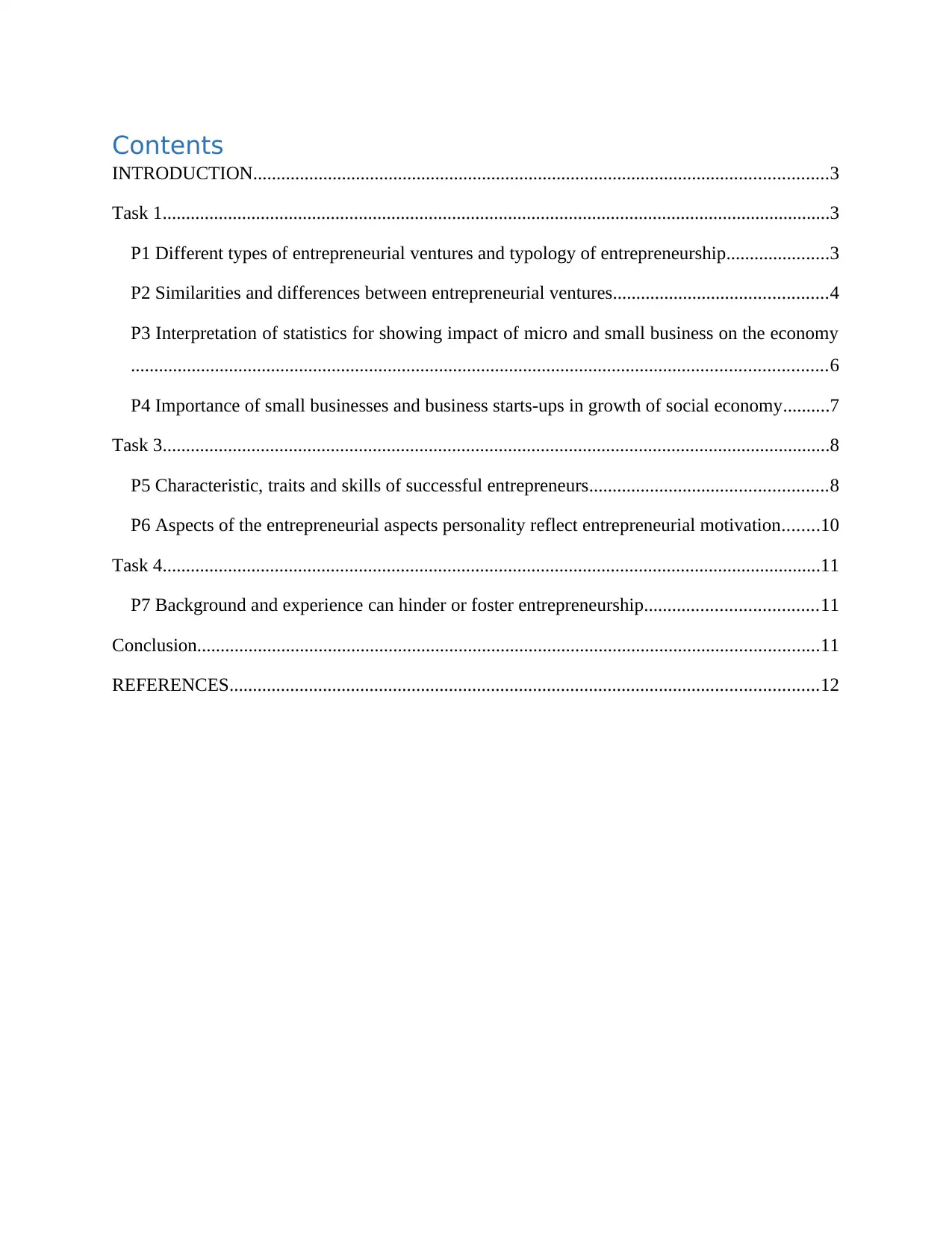
Contents
INTRODUCTION...........................................................................................................................3
Task 1...............................................................................................................................................3
P1 Different types of entrepreneurial ventures and typology of entrepreneurship......................3
P2 Similarities and differences between entrepreneurial ventures..............................................4
P3 Interpretation of statistics for showing impact of micro and small business on the economy
.....................................................................................................................................................6
P4 Importance of small businesses and business starts-ups in growth of social economy..........7
Task 3...............................................................................................................................................8
P5 Characteristic, traits and skills of successful entrepreneurs...................................................8
P6 Aspects of the entrepreneurial aspects personality reflect entrepreneurial motivation........10
Task 4.............................................................................................................................................11
P7 Background and experience can hinder or foster entrepreneurship.....................................11
Conclusion.....................................................................................................................................11
REFERENCES..............................................................................................................................12
INTRODUCTION...........................................................................................................................3
Task 1...............................................................................................................................................3
P1 Different types of entrepreneurial ventures and typology of entrepreneurship......................3
P2 Similarities and differences between entrepreneurial ventures..............................................4
P3 Interpretation of statistics for showing impact of micro and small business on the economy
.....................................................................................................................................................6
P4 Importance of small businesses and business starts-ups in growth of social economy..........7
Task 3...............................................................................................................................................8
P5 Characteristic, traits and skills of successful entrepreneurs...................................................8
P6 Aspects of the entrepreneurial aspects personality reflect entrepreneurial motivation........10
Task 4.............................................................................................................................................11
P7 Background and experience can hinder or foster entrepreneurship.....................................11
Conclusion.....................................................................................................................................11
REFERENCES..............................................................................................................................12
⊘ This is a preview!⊘
Do you want full access?
Subscribe today to unlock all pages.

Trusted by 1+ million students worldwide
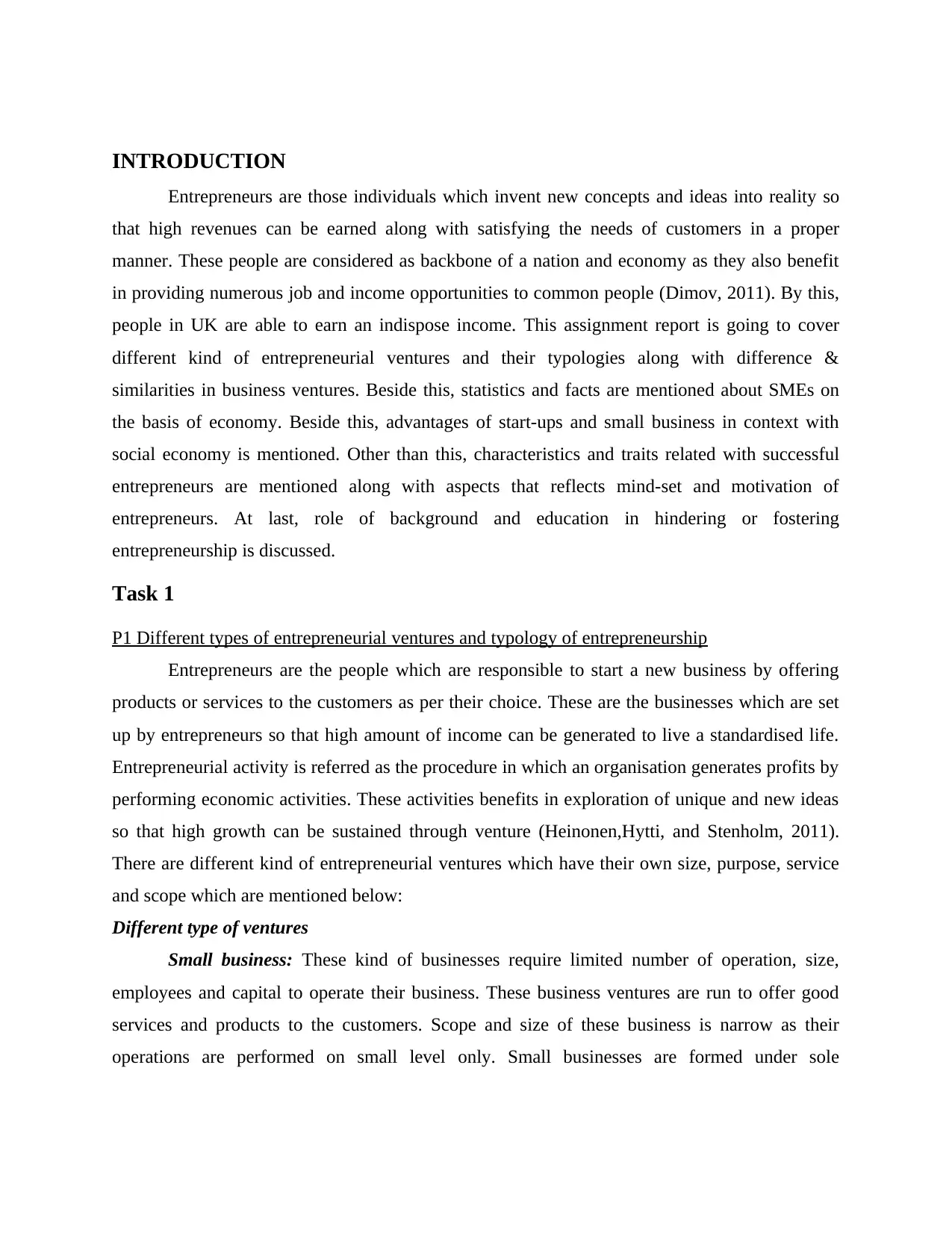
INTRODUCTION
Entrepreneurs are those individuals which invent new concepts and ideas into reality so
that high revenues can be earned along with satisfying the needs of customers in a proper
manner. These people are considered as backbone of a nation and economy as they also benefit
in providing numerous job and income opportunities to common people (Dimov, 2011). By this,
people in UK are able to earn an indispose income. This assignment report is going to cover
different kind of entrepreneurial ventures and their typologies along with difference &
similarities in business ventures. Beside this, statistics and facts are mentioned about SMEs on
the basis of economy. Beside this, advantages of start-ups and small business in context with
social economy is mentioned. Other than this, characteristics and traits related with successful
entrepreneurs are mentioned along with aspects that reflects mind-set and motivation of
entrepreneurs. At last, role of background and education in hindering or fostering
entrepreneurship is discussed.
Task 1
P1 Different types of entrepreneurial ventures and typology of entrepreneurship
Entrepreneurs are the people which are responsible to start a new business by offering
products or services to the customers as per their choice. These are the businesses which are set
up by entrepreneurs so that high amount of income can be generated to live a standardised life.
Entrepreneurial activity is referred as the procedure in which an organisation generates profits by
performing economic activities. These activities benefits in exploration of unique and new ideas
so that high growth can be sustained through venture (Heinonen,Hytti, and Stenholm, 2011).
There are different kind of entrepreneurial ventures which have their own size, purpose, service
and scope which are mentioned below:
Different type of ventures
Small business: These kind of businesses require limited number of operation, size,
employees and capital to operate their business. These business ventures are run to offer good
services and products to the customers. Scope and size of these business is narrow as their
operations are performed on small level only. Small businesses are formed under sole
Entrepreneurs are those individuals which invent new concepts and ideas into reality so
that high revenues can be earned along with satisfying the needs of customers in a proper
manner. These people are considered as backbone of a nation and economy as they also benefit
in providing numerous job and income opportunities to common people (Dimov, 2011). By this,
people in UK are able to earn an indispose income. This assignment report is going to cover
different kind of entrepreneurial ventures and their typologies along with difference &
similarities in business ventures. Beside this, statistics and facts are mentioned about SMEs on
the basis of economy. Beside this, advantages of start-ups and small business in context with
social economy is mentioned. Other than this, characteristics and traits related with successful
entrepreneurs are mentioned along with aspects that reflects mind-set and motivation of
entrepreneurs. At last, role of background and education in hindering or fostering
entrepreneurship is discussed.
Task 1
P1 Different types of entrepreneurial ventures and typology of entrepreneurship
Entrepreneurs are the people which are responsible to start a new business by offering
products or services to the customers as per their choice. These are the businesses which are set
up by entrepreneurs so that high amount of income can be generated to live a standardised life.
Entrepreneurial activity is referred as the procedure in which an organisation generates profits by
performing economic activities. These activities benefits in exploration of unique and new ideas
so that high growth can be sustained through venture (Heinonen,Hytti, and Stenholm, 2011).
There are different kind of entrepreneurial ventures which have their own size, purpose, service
and scope which are mentioned below:
Different type of ventures
Small business: These kind of businesses require limited number of operation, size,
employees and capital to operate their business. These business ventures are run to offer good
services and products to the customers. Scope and size of these business is narrow as their
operations are performed on small level only. Small businesses are formed under sole
Paraphrase This Document
Need a fresh take? Get an instant paraphrase of this document with our AI Paraphraser
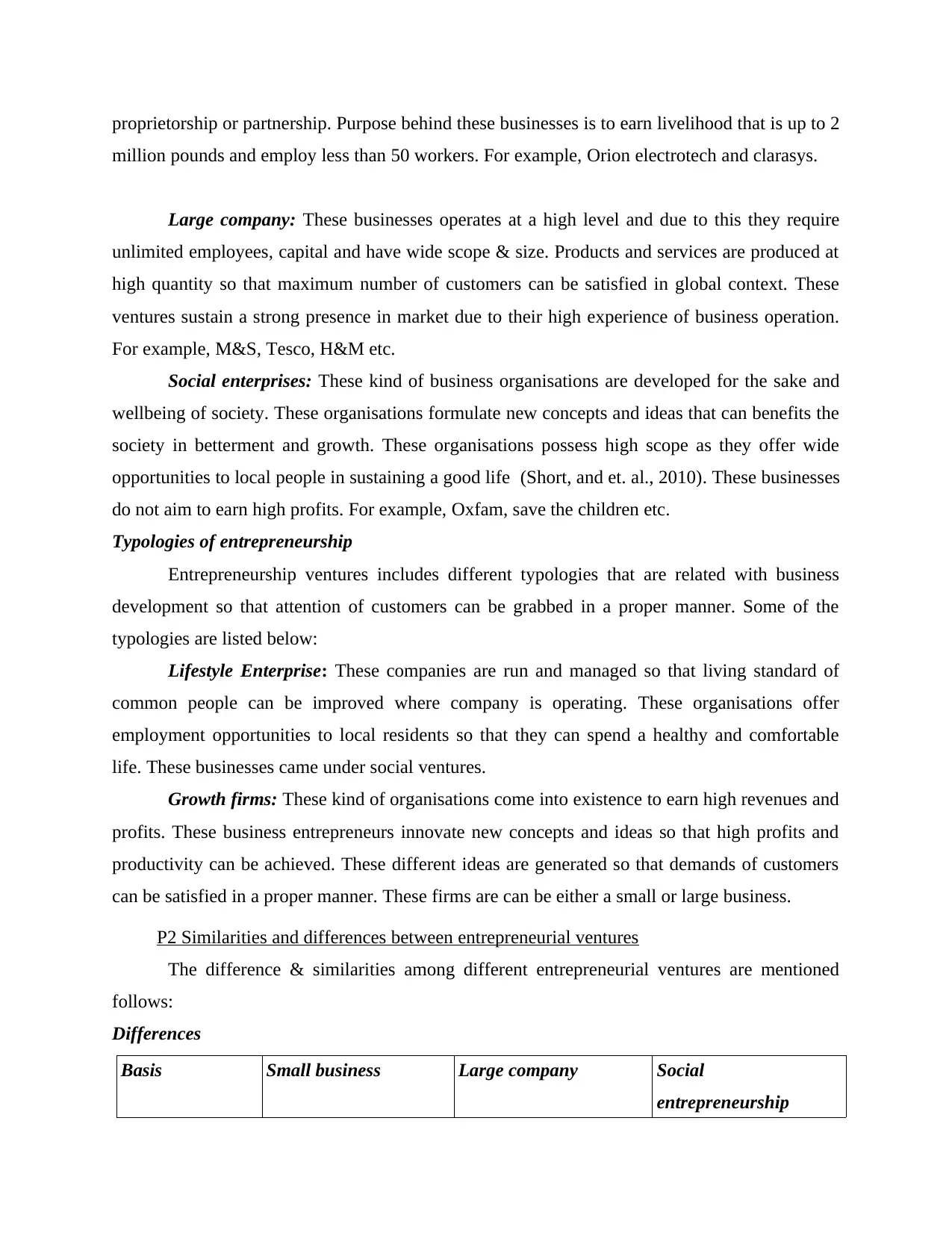
proprietorship or partnership. Purpose behind these businesses is to earn livelihood that is up to 2
million pounds and employ less than 50 workers. For example, Orion electrotech and clarasys.
Large company: These businesses operates at a high level and due to this they require
unlimited employees, capital and have wide scope & size. Products and services are produced at
high quantity so that maximum number of customers can be satisfied in global context. These
ventures sustain a strong presence in market due to their high experience of business operation.
For example, M&S, Tesco, H&M etc.
Social enterprises: These kind of business organisations are developed for the sake and
wellbeing of society. These organisations formulate new concepts and ideas that can benefits the
society in betterment and growth. These organisations possess high scope as they offer wide
opportunities to local people in sustaining a good life (Short, and et. al., 2010). These businesses
do not aim to earn high profits. For example, Oxfam, save the children etc.
Typologies of entrepreneurship
Entrepreneurship ventures includes different typologies that are related with business
development so that attention of customers can be grabbed in a proper manner. Some of the
typologies are listed below:
Lifestyle Enterprise: These companies are run and managed so that living standard of
common people can be improved where company is operating. These organisations offer
employment opportunities to local residents so that they can spend a healthy and comfortable
life. These businesses came under social ventures.
Growth firms: These kind of organisations come into existence to earn high revenues and
profits. These business entrepreneurs innovate new concepts and ideas so that high profits and
productivity can be achieved. These different ideas are generated so that demands of customers
can be satisfied in a proper manner. These firms are can be either a small or large business.
P2 Similarities and differences between entrepreneurial ventures
The difference & similarities among different entrepreneurial ventures are mentioned
follows:
Differences
Basis Small business Large company Social
entrepreneurship
million pounds and employ less than 50 workers. For example, Orion electrotech and clarasys.
Large company: These businesses operates at a high level and due to this they require
unlimited employees, capital and have wide scope & size. Products and services are produced at
high quantity so that maximum number of customers can be satisfied in global context. These
ventures sustain a strong presence in market due to their high experience of business operation.
For example, M&S, Tesco, H&M etc.
Social enterprises: These kind of business organisations are developed for the sake and
wellbeing of society. These organisations formulate new concepts and ideas that can benefits the
society in betterment and growth. These organisations possess high scope as they offer wide
opportunities to local people in sustaining a good life (Short, and et. al., 2010). These businesses
do not aim to earn high profits. For example, Oxfam, save the children etc.
Typologies of entrepreneurship
Entrepreneurship ventures includes different typologies that are related with business
development so that attention of customers can be grabbed in a proper manner. Some of the
typologies are listed below:
Lifestyle Enterprise: These companies are run and managed so that living standard of
common people can be improved where company is operating. These organisations offer
employment opportunities to local residents so that they can spend a healthy and comfortable
life. These businesses came under social ventures.
Growth firms: These kind of organisations come into existence to earn high revenues and
profits. These business entrepreneurs innovate new concepts and ideas so that high profits and
productivity can be achieved. These different ideas are generated so that demands of customers
can be satisfied in a proper manner. These firms are can be either a small or large business.
P2 Similarities and differences between entrepreneurial ventures
The difference & similarities among different entrepreneurial ventures are mentioned
follows:
Differences
Basis Small business Large company Social
entrepreneurship
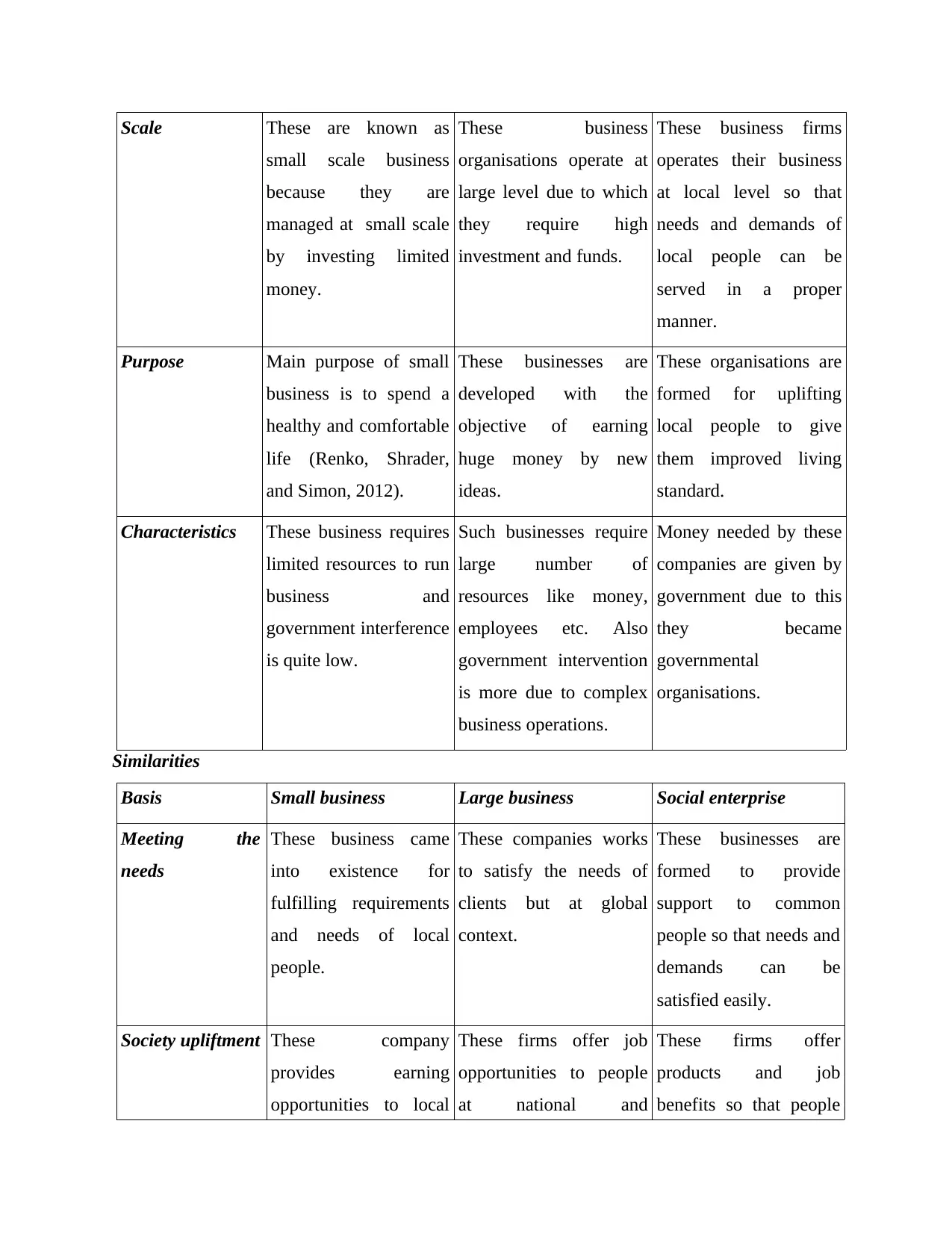
Scale These are known as
small scale business
because they are
managed at small scale
by investing limited
money.
These business
organisations operate at
large level due to which
they require high
investment and funds.
These business firms
operates their business
at local level so that
needs and demands of
local people can be
served in a proper
manner.
Purpose Main purpose of small
business is to spend a
healthy and comfortable
life (Renko, Shrader,
and Simon, 2012).
These businesses are
developed with the
objective of earning
huge money by new
ideas.
These organisations are
formed for uplifting
local people to give
them improved living
standard.
Characteristics These business requires
limited resources to run
business and
government interference
is quite low.
Such businesses require
large number of
resources like money,
employees etc. Also
government intervention
is more due to complex
business operations.
Money needed by these
companies are given by
government due to this
they became
governmental
organisations.
Similarities
Basis Small business Large business Social enterprise
Meeting the
needs
These business came
into existence for
fulfilling requirements
and needs of local
people.
These companies works
to satisfy the needs of
clients but at global
context.
These businesses are
formed to provide
support to common
people so that needs and
demands can be
satisfied easily.
Society upliftment These company
provides earning
opportunities to local
These firms offer job
opportunities to people
at national and
These firms offer
products and job
benefits so that people
small scale business
because they are
managed at small scale
by investing limited
money.
These business
organisations operate at
large level due to which
they require high
investment and funds.
These business firms
operates their business
at local level so that
needs and demands of
local people can be
served in a proper
manner.
Purpose Main purpose of small
business is to spend a
healthy and comfortable
life (Renko, Shrader,
and Simon, 2012).
These businesses are
developed with the
objective of earning
huge money by new
ideas.
These organisations are
formed for uplifting
local people to give
them improved living
standard.
Characteristics These business requires
limited resources to run
business and
government interference
is quite low.
Such businesses require
large number of
resources like money,
employees etc. Also
government intervention
is more due to complex
business operations.
Money needed by these
companies are given by
government due to this
they became
governmental
organisations.
Similarities
Basis Small business Large business Social enterprise
Meeting the
needs
These business came
into existence for
fulfilling requirements
and needs of local
people.
These companies works
to satisfy the needs of
clients but at global
context.
These businesses are
formed to provide
support to common
people so that needs and
demands can be
satisfied easily.
Society upliftment These company
provides earning
opportunities to local
These firms offer job
opportunities to people
at national and
These firms offer
products and job
benefits so that people
⊘ This is a preview!⊘
Do you want full access?
Subscribe today to unlock all pages.

Trusted by 1+ million students worldwide
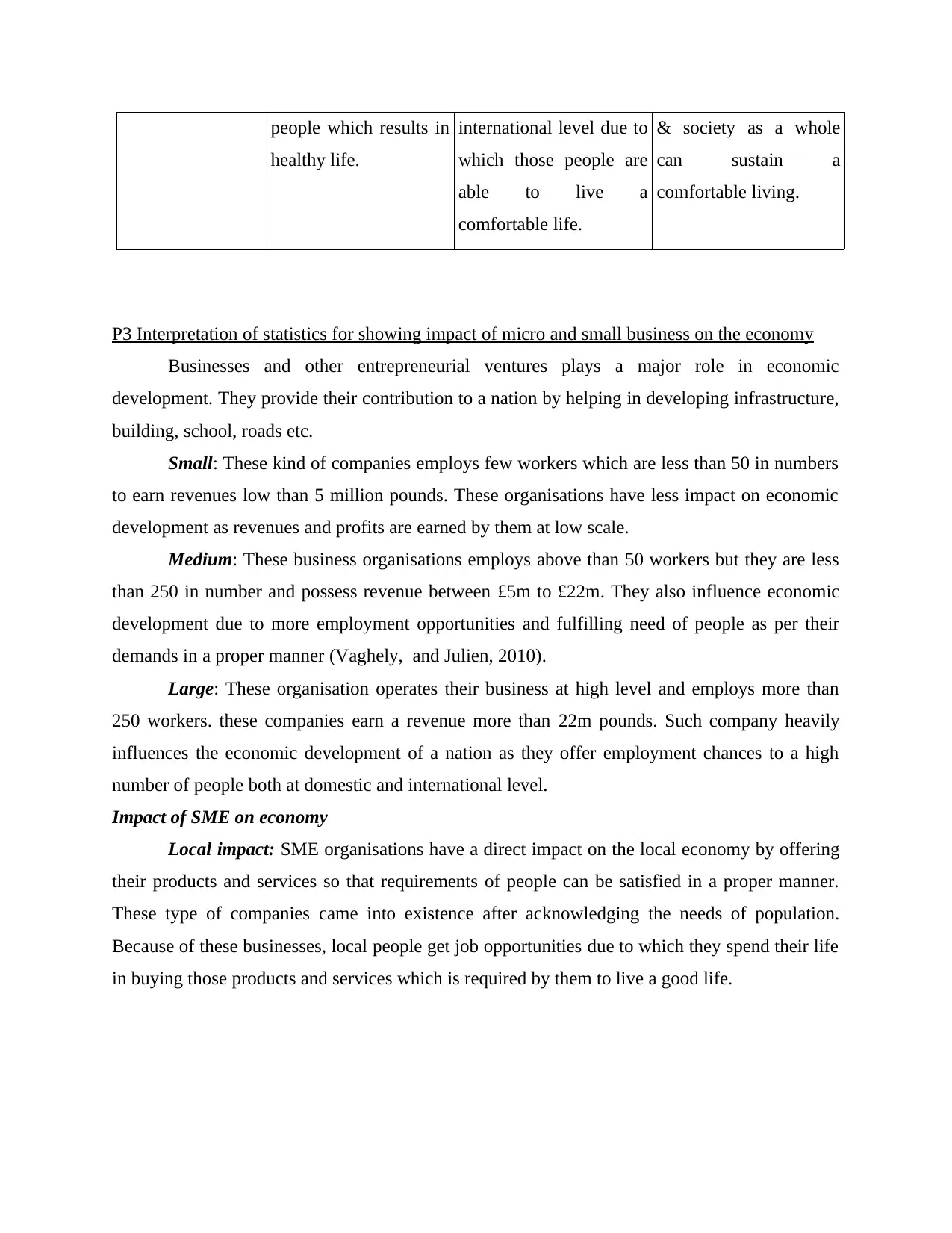
people which results in
healthy life.
international level due to
which those people are
able to live a
comfortable life.
& society as a whole
can sustain a
comfortable living.
P3 Interpretation of statistics for showing impact of micro and small business on the economy
Businesses and other entrepreneurial ventures plays a major role in economic
development. They provide their contribution to a nation by helping in developing infrastructure,
building, school, roads etc.
Small: These kind of companies employs few workers which are less than 50 in numbers
to earn revenues low than 5 million pounds. These organisations have less impact on economic
development as revenues and profits are earned by them at low scale.
Medium: These business organisations employs above than 50 workers but they are less
than 250 in number and possess revenue between £5m to £22m. They also influence economic
development due to more employment opportunities and fulfilling need of people as per their
demands in a proper manner (Vaghely, and Julien, 2010).
Large: These organisation operates their business at high level and employs more than
250 workers. these companies earn a revenue more than 22m pounds. Such company heavily
influences the economic development of a nation as they offer employment chances to a high
number of people both at domestic and international level.
Impact of SME on economy
Local impact: SME organisations have a direct impact on the local economy by offering
their products and services so that requirements of people can be satisfied in a proper manner.
These type of companies came into existence after acknowledging the needs of population.
Because of these businesses, local people get job opportunities due to which they spend their life
in buying those products and services which is required by them to live a good life.
healthy life.
international level due to
which those people are
able to live a
comfortable life.
& society as a whole
can sustain a
comfortable living.
P3 Interpretation of statistics for showing impact of micro and small business on the economy
Businesses and other entrepreneurial ventures plays a major role in economic
development. They provide their contribution to a nation by helping in developing infrastructure,
building, school, roads etc.
Small: These kind of companies employs few workers which are less than 50 in numbers
to earn revenues low than 5 million pounds. These organisations have less impact on economic
development as revenues and profits are earned by them at low scale.
Medium: These business organisations employs above than 50 workers but they are less
than 250 in number and possess revenue between £5m to £22m. They also influence economic
development due to more employment opportunities and fulfilling need of people as per their
demands in a proper manner (Vaghely, and Julien, 2010).
Large: These organisation operates their business at high level and employs more than
250 workers. these companies earn a revenue more than 22m pounds. Such company heavily
influences the economic development of a nation as they offer employment chances to a high
number of people both at domestic and international level.
Impact of SME on economy
Local impact: SME organisations have a direct impact on the local economy by offering
their products and services so that requirements of people can be satisfied in a proper manner.
These type of companies came into existence after acknowledging the needs of population.
Because of these businesses, local people get job opportunities due to which they spend their life
in buying those products and services which is required by them to live a good life.
Paraphrase This Document
Need a fresh take? Get an instant paraphrase of this document with our AI Paraphraser
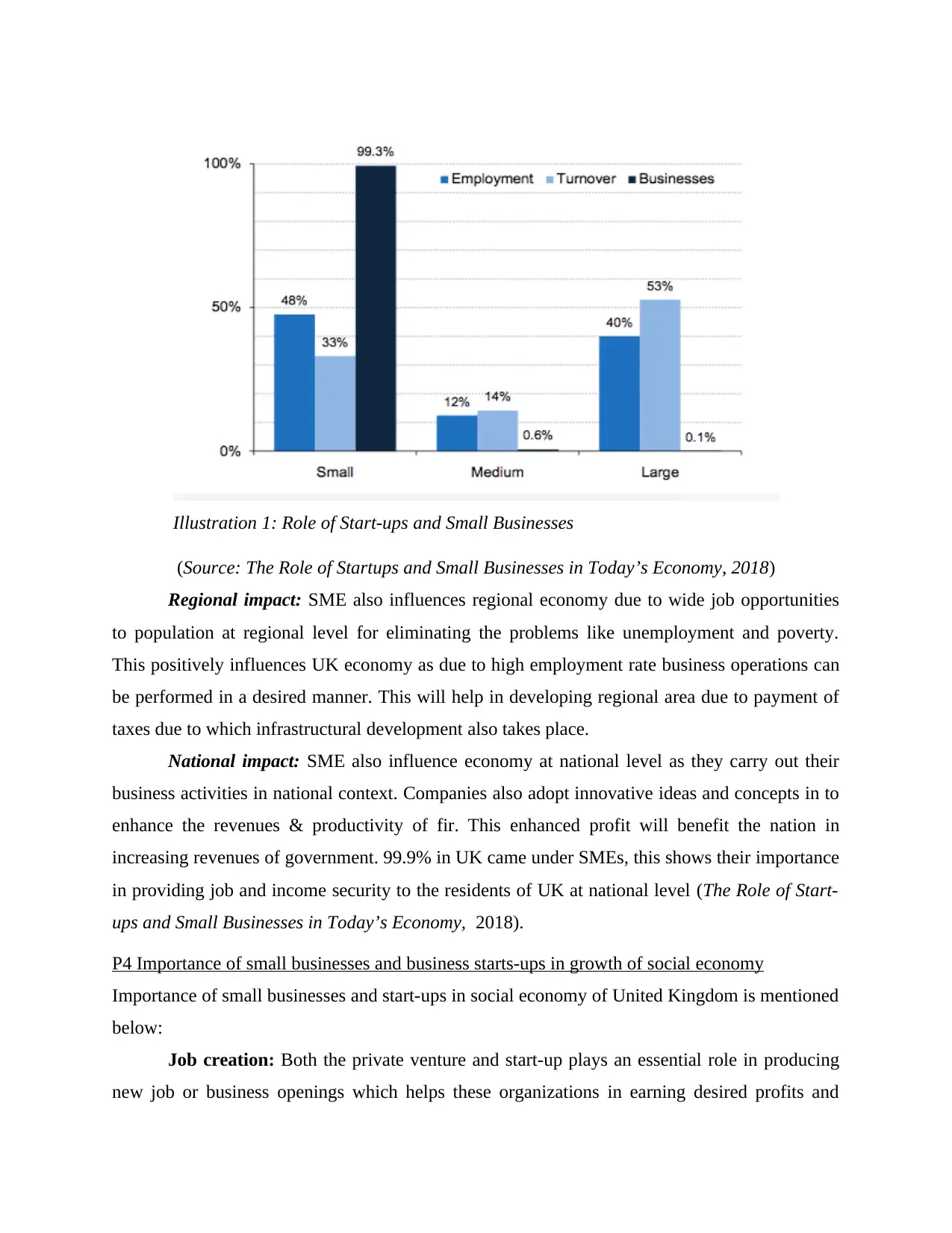
(Source: The Role of Startups and Small Businesses in Today’s Economy, 2018)
Regional impact: SME also influences regional economy due to wide job opportunities
to population at regional level for eliminating the problems like unemployment and poverty.
This positively influences UK economy as due to high employment rate business operations can
be performed in a desired manner. This will help in developing regional area due to payment of
taxes due to which infrastructural development also takes place.
National impact: SME also influence economy at national level as they carry out their
business activities in national context. Companies also adopt innovative ideas and concepts in to
enhance the revenues & productivity of fir. This enhanced profit will benefit the nation in
increasing revenues of government. 99.9% in UK came under SMEs, this shows their importance
in providing job and income security to the residents of UK at national level (The Role of Start-
ups and Small Businesses in Today’s Economy, 2018).
P4 Importance of small businesses and business starts-ups in growth of social economy
Importance of small businesses and start-ups in social economy of United Kingdom is mentioned
below:
Job creation: Both the private venture and start-up plays an essential role in producing
new job or business openings which helps these organizations in earning desired profits and
Illustration 1: Role of Start-ups and Small Businesses
Regional impact: SME also influences regional economy due to wide job opportunities
to population at regional level for eliminating the problems like unemployment and poverty.
This positively influences UK economy as due to high employment rate business operations can
be performed in a desired manner. This will help in developing regional area due to payment of
taxes due to which infrastructural development also takes place.
National impact: SME also influence economy at national level as they carry out their
business activities in national context. Companies also adopt innovative ideas and concepts in to
enhance the revenues & productivity of fir. This enhanced profit will benefit the nation in
increasing revenues of government. 99.9% in UK came under SMEs, this shows their importance
in providing job and income security to the residents of UK at national level (The Role of Start-
ups and Small Businesses in Today’s Economy, 2018).
P4 Importance of small businesses and business starts-ups in growth of social economy
Importance of small businesses and start-ups in social economy of United Kingdom is mentioned
below:
Job creation: Both the private venture and start-up plays an essential role in producing
new job or business openings which helps these organizations in earning desired profits and
Illustration 1: Role of Start-ups and Small Businesses
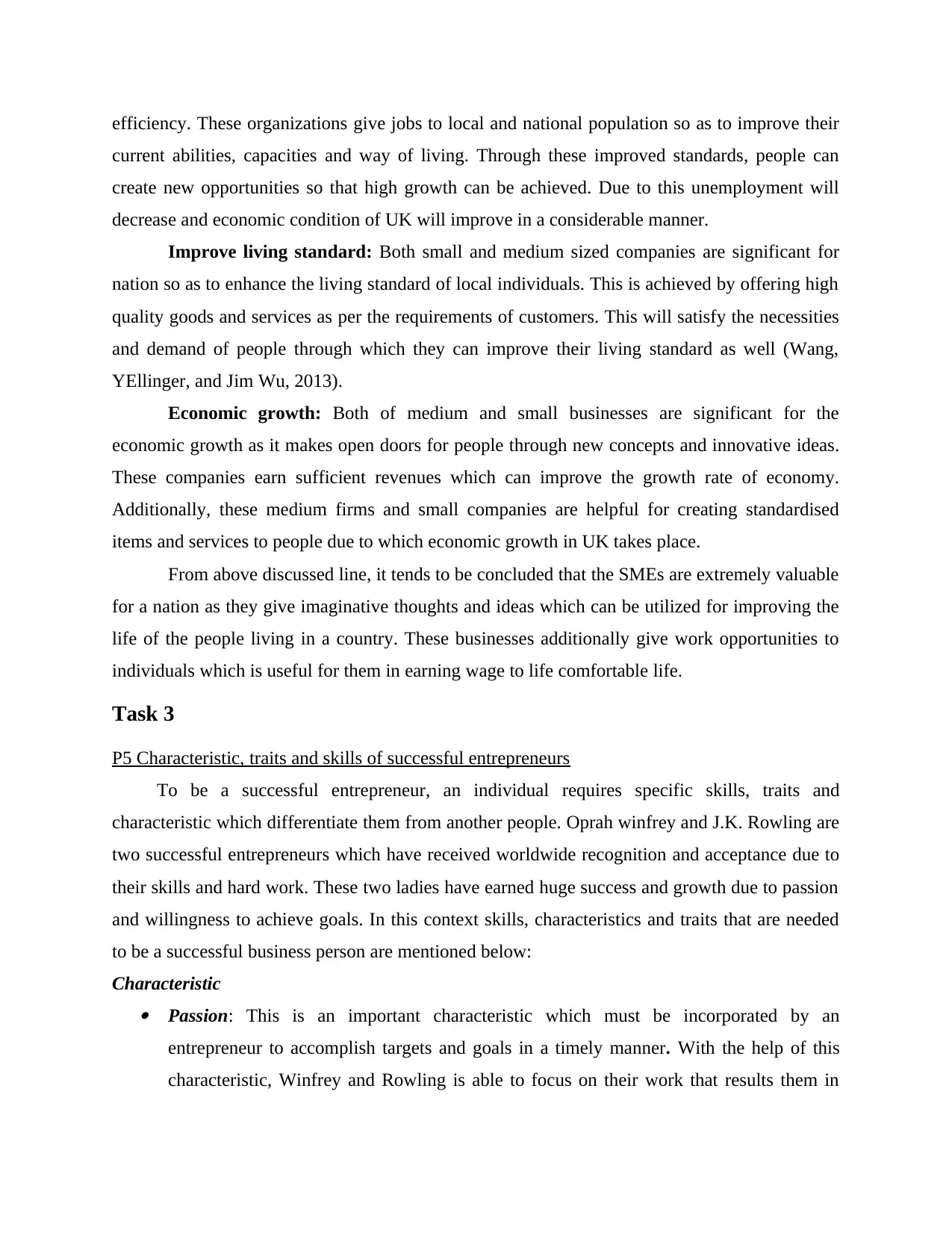
efficiency. These organizations give jobs to local and national population so as to improve their
current abilities, capacities and way of living. Through these improved standards, people can
create new opportunities so that high growth can be achieved. Due to this unemployment will
decrease and economic condition of UK will improve in a considerable manner.
Improve living standard: Both small and medium sized companies are significant for
nation so as to enhance the living standard of local individuals. This is achieved by offering high
quality goods and services as per the requirements of customers. This will satisfy the necessities
and demand of people through which they can improve their living standard as well (Wang,
YEllinger, and Jim Wu, 2013).
Economic growth: Both of medium and small businesses are significant for the
economic growth as it makes open doors for people through new concepts and innovative ideas.
These companies earn sufficient revenues which can improve the growth rate of economy.
Additionally, these medium firms and small companies are helpful for creating standardised
items and services to people due to which economic growth in UK takes place.
From above discussed line, it tends to be concluded that the SMEs are extremely valuable
for a nation as they give imaginative thoughts and ideas which can be utilized for improving the
life of the people living in a country. These businesses additionally give work opportunities to
individuals which is useful for them in earning wage to life comfortable life.
Task 3
P5 Characteristic, traits and skills of successful entrepreneurs
To be a successful entrepreneur, an individual requires specific skills, traits and
characteristic which differentiate them from another people. Oprah winfrey and J.K. Rowling are
two successful entrepreneurs which have received worldwide recognition and acceptance due to
their skills and hard work. These two ladies have earned huge success and growth due to passion
and willingness to achieve goals. In this context skills, characteristics and traits that are needed
to be a successful business person are mentioned below:
Characteristic Passion: This is an important characteristic which must be incorporated by an
entrepreneur to accomplish targets and goals in a timely manner. With the help of this
characteristic, Winfrey and Rowling is able to focus on their work that results them in
current abilities, capacities and way of living. Through these improved standards, people can
create new opportunities so that high growth can be achieved. Due to this unemployment will
decrease and economic condition of UK will improve in a considerable manner.
Improve living standard: Both small and medium sized companies are significant for
nation so as to enhance the living standard of local individuals. This is achieved by offering high
quality goods and services as per the requirements of customers. This will satisfy the necessities
and demand of people through which they can improve their living standard as well (Wang,
YEllinger, and Jim Wu, 2013).
Economic growth: Both of medium and small businesses are significant for the
economic growth as it makes open doors for people through new concepts and innovative ideas.
These companies earn sufficient revenues which can improve the growth rate of economy.
Additionally, these medium firms and small companies are helpful for creating standardised
items and services to people due to which economic growth in UK takes place.
From above discussed line, it tends to be concluded that the SMEs are extremely valuable
for a nation as they give imaginative thoughts and ideas which can be utilized for improving the
life of the people living in a country. These businesses additionally give work opportunities to
individuals which is useful for them in earning wage to life comfortable life.
Task 3
P5 Characteristic, traits and skills of successful entrepreneurs
To be a successful entrepreneur, an individual requires specific skills, traits and
characteristic which differentiate them from another people. Oprah winfrey and J.K. Rowling are
two successful entrepreneurs which have received worldwide recognition and acceptance due to
their skills and hard work. These two ladies have earned huge success and growth due to passion
and willingness to achieve goals. In this context skills, characteristics and traits that are needed
to be a successful business person are mentioned below:
Characteristic Passion: This is an important characteristic which must be incorporated by an
entrepreneur to accomplish targets and goals in a timely manner. With the help of this
characteristic, Winfrey and Rowling is able to focus on their work that results them in
⊘ This is a preview!⊘
Do you want full access?
Subscribe today to unlock all pages.

Trusted by 1+ million students worldwide
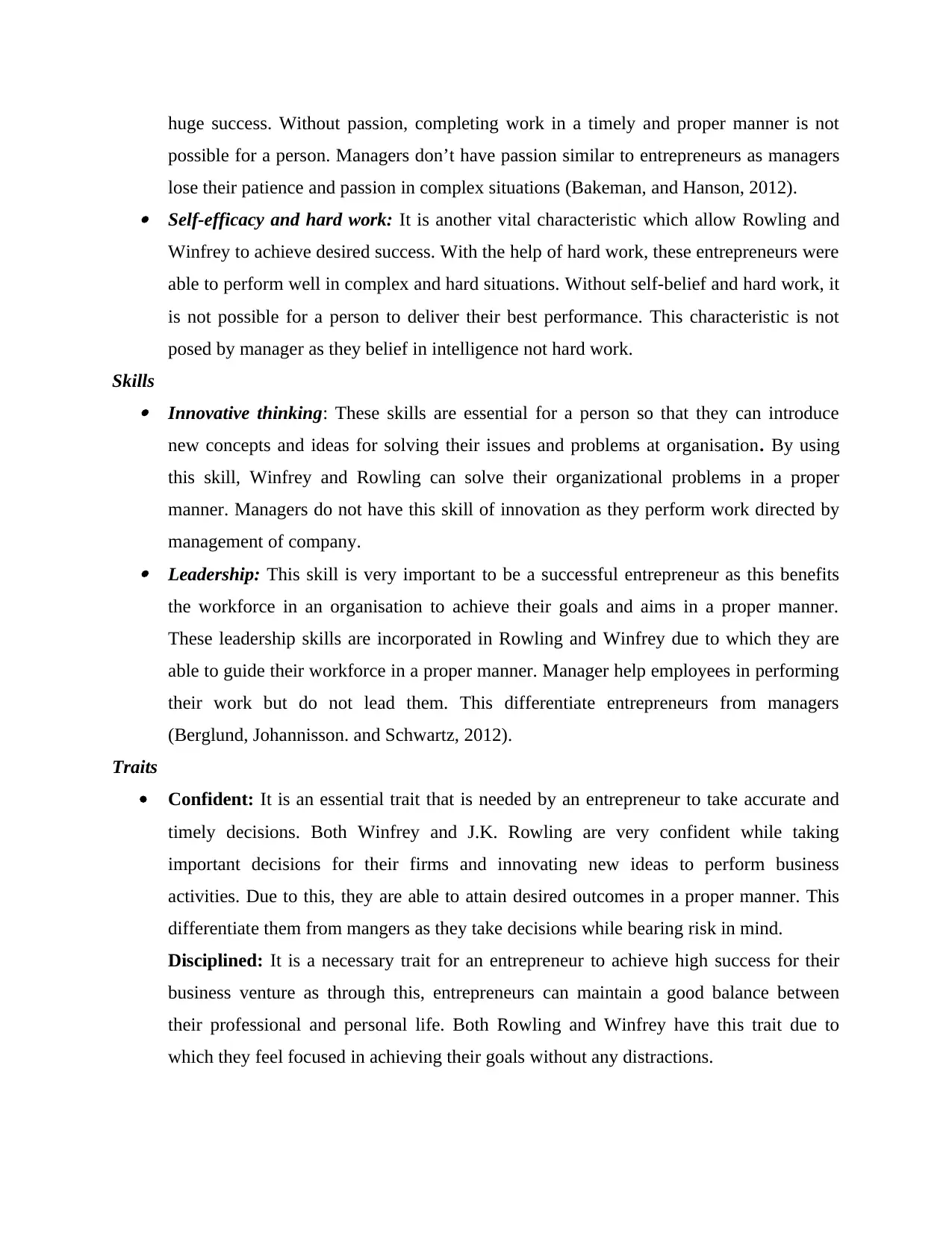
huge success. Without passion, completing work in a timely and proper manner is not
possible for a person. Managers don’t have passion similar to entrepreneurs as managers
lose their patience and passion in complex situations (Bakeman, and Hanson, 2012). Self-efficacy and hard work: It is another vital characteristic which allow Rowling and
Winfrey to achieve desired success. With the help of hard work, these entrepreneurs were
able to perform well in complex and hard situations. Without self-belief and hard work, it
is not possible for a person to deliver their best performance. This characteristic is not
posed by manager as they belief in intelligence not hard work.
Skills Innovative thinking: These skills are essential for a person so that they can introduce
new concepts and ideas for solving their issues and problems at organisation. By using
this skill, Winfrey and Rowling can solve their organizational problems in a proper
manner. Managers do not have this skill of innovation as they perform work directed by
management of company. Leadership: This skill is very important to be a successful entrepreneur as this benefits
the workforce in an organisation to achieve their goals and aims in a proper manner.
These leadership skills are incorporated in Rowling and Winfrey due to which they are
able to guide their workforce in a proper manner. Manager help employees in performing
their work but do not lead them. This differentiate entrepreneurs from managers
(Berglund, Johannisson. and Schwartz, 2012).
Traits
Confident: It is an essential trait that is needed by an entrepreneur to take accurate and
timely decisions. Both Winfrey and J.K. Rowling are very confident while taking
important decisions for their firms and innovating new ideas to perform business
activities. Due to this, they are able to attain desired outcomes in a proper manner. This
differentiate them from mangers as they take decisions while bearing risk in mind.
Disciplined: It is a necessary trait for an entrepreneur to achieve high success for their
business venture as through this, entrepreneurs can maintain a good balance between
their professional and personal life. Both Rowling and Winfrey have this trait due to
which they feel focused in achieving their goals without any distractions.
possible for a person. Managers don’t have passion similar to entrepreneurs as managers
lose their patience and passion in complex situations (Bakeman, and Hanson, 2012). Self-efficacy and hard work: It is another vital characteristic which allow Rowling and
Winfrey to achieve desired success. With the help of hard work, these entrepreneurs were
able to perform well in complex and hard situations. Without self-belief and hard work, it
is not possible for a person to deliver their best performance. This characteristic is not
posed by manager as they belief in intelligence not hard work.
Skills Innovative thinking: These skills are essential for a person so that they can introduce
new concepts and ideas for solving their issues and problems at organisation. By using
this skill, Winfrey and Rowling can solve their organizational problems in a proper
manner. Managers do not have this skill of innovation as they perform work directed by
management of company. Leadership: This skill is very important to be a successful entrepreneur as this benefits
the workforce in an organisation to achieve their goals and aims in a proper manner.
These leadership skills are incorporated in Rowling and Winfrey due to which they are
able to guide their workforce in a proper manner. Manager help employees in performing
their work but do not lead them. This differentiate entrepreneurs from managers
(Berglund, Johannisson. and Schwartz, 2012).
Traits
Confident: It is an essential trait that is needed by an entrepreneur to take accurate and
timely decisions. Both Winfrey and J.K. Rowling are very confident while taking
important decisions for their firms and innovating new ideas to perform business
activities. Due to this, they are able to attain desired outcomes in a proper manner. This
differentiate them from mangers as they take decisions while bearing risk in mind.
Disciplined: It is a necessary trait for an entrepreneur to achieve high success for their
business venture as through this, entrepreneurs can maintain a good balance between
their professional and personal life. Both Rowling and Winfrey have this trait due to
which they feel focused in achieving their goals without any distractions.
Paraphrase This Document
Need a fresh take? Get an instant paraphrase of this document with our AI Paraphraser
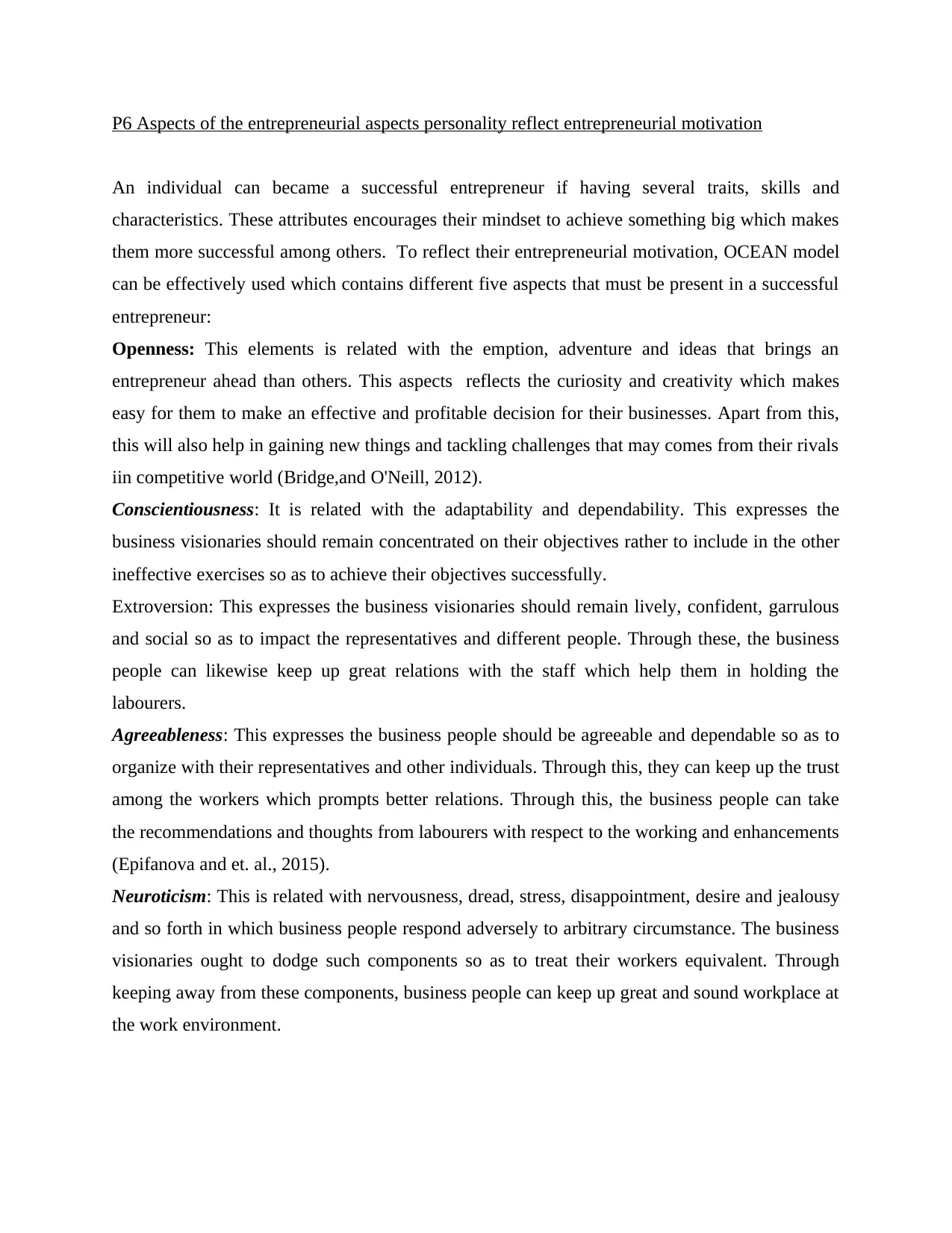
P6 Aspects of the entrepreneurial aspects personality reflect entrepreneurial motivation
An individual can became a successful entrepreneur if having several traits, skills and
characteristics. These attributes encourages their mindset to achieve something big which makes
them more successful among others. To reflect their entrepreneurial motivation, OCEAN model
can be effectively used which contains different five aspects that must be present in a successful
entrepreneur:
Openness: This elements is related with the emption, adventure and ideas that brings an
entrepreneur ahead than others. This aspects reflects the curiosity and creativity which makes
easy for them to make an effective and profitable decision for their businesses. Apart from this,
this will also help in gaining new things and tackling challenges that may comes from their rivals
iin competitive world (Bridge,and O'Neill, 2012).
Conscientiousness: It is related with the adaptability and dependability. This expresses the
business visionaries should remain concentrated on their objectives rather to include in the other
ineffective exercises so as to achieve their objectives successfully.
Extroversion: This expresses the business visionaries should remain lively, confident, garrulous
and social so as to impact the representatives and different people. Through these, the business
people can likewise keep up great relations with the staff which help them in holding the
labourers.
Agreeableness: This expresses the business people should be agreeable and dependable so as to
organize with their representatives and other individuals. Through this, they can keep up the trust
among the workers which prompts better relations. Through this, the business people can take
the recommendations and thoughts from labourers with respect to the working and enhancements
(Epifanova and et. al., 2015).
Neuroticism: This is related with nervousness, dread, stress, disappointment, desire and jealousy
and so forth in which business people respond adversely to arbitrary circumstance. The business
visionaries ought to dodge such components so as to treat their workers equivalent. Through
keeping away from these components, business people can keep up great and sound workplace at
the work environment.
An individual can became a successful entrepreneur if having several traits, skills and
characteristics. These attributes encourages their mindset to achieve something big which makes
them more successful among others. To reflect their entrepreneurial motivation, OCEAN model
can be effectively used which contains different five aspects that must be present in a successful
entrepreneur:
Openness: This elements is related with the emption, adventure and ideas that brings an
entrepreneur ahead than others. This aspects reflects the curiosity and creativity which makes
easy for them to make an effective and profitable decision for their businesses. Apart from this,
this will also help in gaining new things and tackling challenges that may comes from their rivals
iin competitive world (Bridge,and O'Neill, 2012).
Conscientiousness: It is related with the adaptability and dependability. This expresses the
business visionaries should remain concentrated on their objectives rather to include in the other
ineffective exercises so as to achieve their objectives successfully.
Extroversion: This expresses the business visionaries should remain lively, confident, garrulous
and social so as to impact the representatives and different people. Through these, the business
people can likewise keep up great relations with the staff which help them in holding the
labourers.
Agreeableness: This expresses the business people should be agreeable and dependable so as to
organize with their representatives and other individuals. Through this, they can keep up the trust
among the workers which prompts better relations. Through this, the business people can take
the recommendations and thoughts from labourers with respect to the working and enhancements
(Epifanova and et. al., 2015).
Neuroticism: This is related with nervousness, dread, stress, disappointment, desire and jealousy
and so forth in which business people respond adversely to arbitrary circumstance. The business
visionaries ought to dodge such components so as to treat their workers equivalent. Through
keeping away from these components, business people can keep up great and sound workplace at
the work environment.

Task 4
P7 Background and experience can hinder or foster entrepreneurship
Entrepreneurs manages and runs their business to earn high profits and revenues. With the
help of right background, experience and education, it became easy for a person to achieve
desired success and results. In this context, background of Operah Winfrey and J.K. Rowling is
discussed below:
Oprah Winfrey
Background and experience: Oprah Winfrey is an African American which is a renowned media
executive, talk show host, television producer and a philanthropist. She was born in Mississippi
to an unmarried mother. Her mother was a housemaid and her biological father was a coal miner
earlier and then turned into a barber but another person Noah Robinson claims to be her father.
Oprah Winfrey was very poor and she never had enough food to feed herself. Oprah had three
half-siblings and she was molested by her cousin. She was not given proper love and education,
due to which she faced so many difficulties in earning a stable livelihood. At the age of 13 she
ran from home and got pregnant but her son died due to premature birth. She felt very alone and
try to end her life due to all these circumstances but she chooses to live a good life and studied
communication. She do different jobs and won beauty pageant. After all these hardships she
becam a successful show host and earn success (Hall, and Wagner, 2012).
J.K. Rowling
Background and experience: She is a British based novelist, philanthropist, producer and an
entrepreneur. She is well famous for Harry potter series. She was born to Peter James Rowling
which was an aircraft engineer and her mother was a science technician. Her teenage days were
not happy as her mother has multiple Sclerosis. Due to which she faced very hardships and her
life was quite miserable. After getting so many rejections, she faced a success by the publications
of Harry potter (Kelley, Singer, Sand Herrington, 2012).
Due to these hardships both entrepreneurs were able to achieve high success and growth
as they learn how to pass the complex situations in a proper manner.
Conclusion
From above mentioned report, it is concluded that entrepreneurs are those individuals
which transforms ideas into reality to earn high revenues and profits. There are various
P7 Background and experience can hinder or foster entrepreneurship
Entrepreneurs manages and runs their business to earn high profits and revenues. With the
help of right background, experience and education, it became easy for a person to achieve
desired success and results. In this context, background of Operah Winfrey and J.K. Rowling is
discussed below:
Oprah Winfrey
Background and experience: Oprah Winfrey is an African American which is a renowned media
executive, talk show host, television producer and a philanthropist. She was born in Mississippi
to an unmarried mother. Her mother was a housemaid and her biological father was a coal miner
earlier and then turned into a barber but another person Noah Robinson claims to be her father.
Oprah Winfrey was very poor and she never had enough food to feed herself. Oprah had three
half-siblings and she was molested by her cousin. She was not given proper love and education,
due to which she faced so many difficulties in earning a stable livelihood. At the age of 13 she
ran from home and got pregnant but her son died due to premature birth. She felt very alone and
try to end her life due to all these circumstances but she chooses to live a good life and studied
communication. She do different jobs and won beauty pageant. After all these hardships she
becam a successful show host and earn success (Hall, and Wagner, 2012).
J.K. Rowling
Background and experience: She is a British based novelist, philanthropist, producer and an
entrepreneur. She is well famous for Harry potter series. She was born to Peter James Rowling
which was an aircraft engineer and her mother was a science technician. Her teenage days were
not happy as her mother has multiple Sclerosis. Due to which she faced very hardships and her
life was quite miserable. After getting so many rejections, she faced a success by the publications
of Harry potter (Kelley, Singer, Sand Herrington, 2012).
Due to these hardships both entrepreneurs were able to achieve high success and growth
as they learn how to pass the complex situations in a proper manner.
Conclusion
From above mentioned report, it is concluded that entrepreneurs are those individuals
which transforms ideas into reality to earn high revenues and profits. There are various
⊘ This is a preview!⊘
Do you want full access?
Subscribe today to unlock all pages.

Trusted by 1+ million students worldwide
1 out of 14
Related Documents
Your All-in-One AI-Powered Toolkit for Academic Success.
+13062052269
info@desklib.com
Available 24*7 on WhatsApp / Email
![[object Object]](/_next/static/media/star-bottom.7253800d.svg)
Unlock your academic potential
Copyright © 2020–2025 A2Z Services. All Rights Reserved. Developed and managed by ZUCOL.





